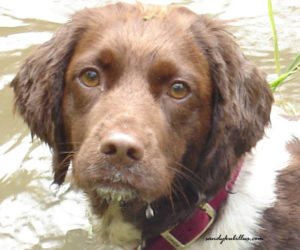Have you really looked at your dog’s nose? A stupid question you might think. But I just read something that made me look back at old photos to check.
I read this quote on Barkhow.com: “It is genetically impossible for a liver dog to have a black nose.”
I’ve owned two liver and white springer spaniels and I remember Cassie having a brown nose that matched most of her body. But I had to check on Kaylee—I could have sworn she had a black nose, but the photos proved me wrong.
Buffy, my cocker spaniel has a brown nose, while all my other cockers had black noses. I always liked to tease them and call them brown nosers.

So what makes a dog’s nose brown instead of black?
There’s a lot more to it than I thought.
First, they don’t call it a brown nose, it’s called a pink or flesh-colored nose – although they look more brown to me, but apparently, they can vary from brown to a much lighter pink.
Often it is genetic causing them to have a lighter colored nose over a black nose, but sometimes, especially if it has changed, it could indicate something else.
Should you be concerned if your dog has a light colored nose?
If your dog always had a light colored nose, it is just in her genes. The risk for sunburn is higher on their nose and some veterinarians (including Dr. Karen Becker) recommend using sunscreen on their noses to offer extra protection.
I never put sunscreen on my springers and they were out in the bright sun in canoes quite often. They didn’t seem to get sunburned, but they both did die from cancer (although not skin cancer), so maybe I should have.
Conditions causing loss of pigmentation in a dog’s nose
- Snow nose – a change of color that occurs during
the winter. Often just the middle of their nose is affected and their dark
color returns once the dog spends more time outside in the warmer months. - Age – puppies noses often are lighter in color and
darken as they age, while senior dogs may lose coloring. - Dudley’s nose – occurs when a dog’s nose fades
from black to light brown or pink and does not return to its black color. This
is can be considered a fault in a breed standard. - Vitiligo – an immune disease that causes a dog
to lose color on their nose and body. They usually also develop white patches
elsewhere on their skin. - Contact dermatitis – a dog is allergic to things
that he touches with his nose. The allergic reaction may also affect the dog’s
lips or other parts of his face. - Infections or injury – these can temporarily
change the color of a dog’s nose
To view photos of many types of dog nose coloration and patterns click here and here.
The bottom line is that nose coloring in a dog is not usually something to be concerned about unless it changes suddenly or there are other symptoms.
Have you owned a dog with a nose that changed colors or was not black?
If you’d like to receive future copies of my blog, please subscribe in the top right corner.


No, our guys always have black noses. A friend’s dog did have Collie nose, though; it was quite apparent there was a problem.
I had no idea that there’s a thing called snow nose! I know with our dogs it’s been aging. And each dog’s nose fades differently. We’ve had spotty aging to fading all over from dark brown, mid-brown, light brown, and a very ash brown. We’ve heard about the possibility of sunburn with a lighter nose – and with that we’ve had to increase our dog’s sunburn ‘cream.’
I have read about putting sunscreen on dogs noses if they are brown but never have really thought about the colors of dogs noses, Layla has a black one.